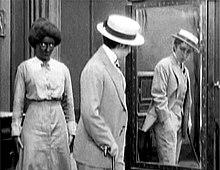| A Florida Enchantment | |
|---|---|
 Edith Storey as Lillian Travers/Lawrence Talbot | |
| Directed by | Sidney Drew |
| Produced by | Sidney Drew |
| Written by | Marguerite Bertsch Eugene Mullin |
| Starring | Edith Storey Sidney Drew Ethel Lloyd |
| Cinematography | Robert A. Stuart |
| Distributed by | Vitagraph Studios |
Release date |
|
Running time | 5 reels |
| Country | United States |
| Language | Silent film English intertitles |
A Florida Enchantment (1914) is a silent film directed by Sidney Drew and released by Vitagraph Studios. It is notable for its depiction of lesbian, gay, and transgender themes.[1][2] The film is based on the 1891 novel and 1896 play (now lost) of the same name written by Fergus Redmond and Archibald Clavering Gunter.
Plot
In the film, Lillian Travers, a wealthy Northern woman about to be married, visits her aunt in Florida. While there, she stops in a curiosity shop and buys a small casket which contains a note and a vial of seeds. At her aunt's house she reads the note which explains that the seeds change men into women and vice versa. Angry with her fiancé, Fred, Lillian decides to test the effects of the seeds. The next morning, Lillian discovers that she has transformed into a man. Lillian's transformation into Lawrence Talbot has also sometimes been read as a transformation into a butch lesbian. This reading is bolstered by the later transformation of Lillian's fiancé into what could be an effeminate gay man. However, as Lillian and her fiancé are shown attracted both to each other and to the same sex (albeit at different times), the film has also been considered to have the first documented appearance of bisexual characters in an American motion picture.[3]
Cast
- Edith Storey - Lillian Travers/Lawrence Talbot
- Sidney Drew - Dr. Frederick Cassadene
- Ethel Lloyd - Jane
- Grace Stevens - Constancia Oglethorpe
- Charles Kent - Major Horton
- Jane Morrow - Bessie Horton
- Ada Gifford - Stella Lovejoy
- Lillian Burns - Malvina
- Allan Campbell - Stockton Remington
- Cortland van Deusen - Charley Wilkes
- Frank O'Neil - Gustavus Duncan
Production background
The film is also known for its use of blackface antics; an aspect carefully dissected in Siobhan Somerville's "Queering the Color Line." Since its inclusion in Vito Russo's The Celluloid Closet, the film has increasingly been seen as one of the earliest film representations of homosexuality and cross-dressing in American culture.
References
- ^ Horak, Laura (2016). Girls Will Be Boys: Cross-Dressed Women, Lesbians, and American Cinema, 1908-1934. Rutgers University Press. p. 107. ISBN 978-0813574837.
- ^ Bean, Jennifer M.; Negra, Diane, eds. (2002). A Feminist Reader in Early Cinema. Duke University Press. pp. 251–252. ISBN 0822330253.
- ^ "Bisexuality in Film". glbtq. Archived from the original on 2012-10-15. Retrieved 2012-11-06.
External links
- A Florida Enchantment at IMDb